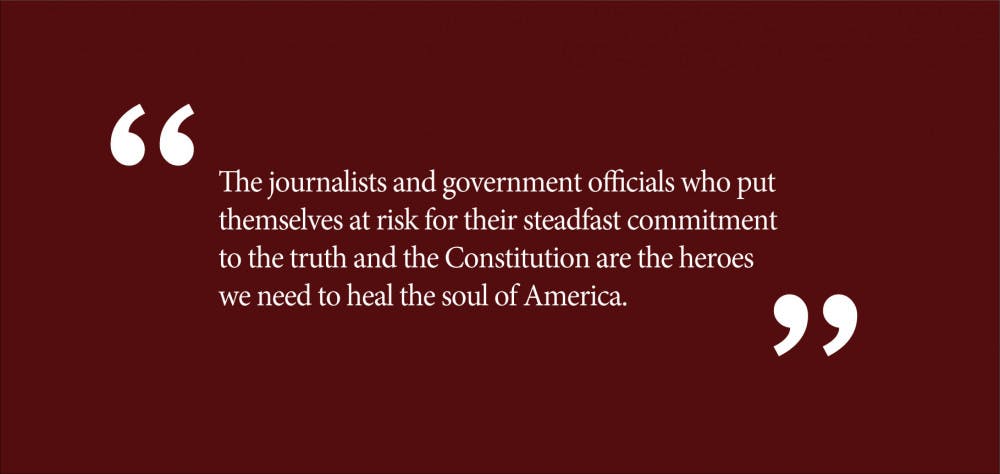Around the anniversary of the extrajudicial murder of journalist Jamal Khashoggi, New York Times publisher A.G. Sulzberger ’03 delivered a stirring speech on campus about the mounting threat to journalism at home and abroad. He warned that a free press is no longer a given in an era of disruption and disinformation fomented by the President of the United States. While Sulzberger cited examples of retaliatory actions by the Russian and Egyptian governments against journalists, perhaps what was most shocking was the United States’ retreat from protecting our own journalists, our fellow Americans, from press-hostile states. Is the current administration declining to protect American journalists abroad because their profession does not align with the president’s cynical worldview? Top Trumpists like Secretary of State Mike Pompeo might adhere to that maxim. But what saved a Times reporter from unlawful imprisonment was an unauthorized warning from a lower ranking foreign service official.
Historically, the relationship between such officials and the press is far from rosy; the values of discretion and sensitivity often conflict with disclosure and transparency. But as former war correspondent and United Nations Ambassador Samantha Power mentioned during the Krieger Memorial lecture last month, the reporters tasked with bringing stories to life to affect change and the officials charged with bringing policy to fruition to protect interests share a noble purpose: speaking truth to power. The fourth estate and the foreign service-national security apparatus are essential checks on the politicians, institutions and individuals responsible for serving the nation.
In an era when top cabinet members depart from democratic ideals at the behest of an illiberal president, it has fallen on the press and lower ranking diplomats to defend these ideas. Together, these two groups are among the vital organs of our democracy, guardians of our way of life by exercising integrity, expertise and commitment to the cause of a free and just world.
Since the beginning of the Trump era, journalists, career diplomats and foreign policy officials have been decried as “the enemy of the people” and the “deep state.” Born out of distrust of elite structures, Trumpists have indicted the press and career government officials as fundamentally anti-American. The cabal of “fake news” pushers and “treasonous” culprits are cast as stewards of a shadow system of collusion; they are the ultimate guardians of the swamp. Fueled by paranoia and displeasure of accountability, Trump found the perfect boogeymen to frame for his self-victimization and to justify his chaotic presidency as under assault from outside and within. Tragically, the president’s strategy has worked to some extent. Public confidence in the press remains low and worldwide threats to journalists are at the highest levels in the last ten years. The systematic gutting of the State Department and relegation of the National Security Council by Pompeo and other Trump loyalists has diminished the stature and ability of these bodies to effectively carry out their missions. However, the president has failed elsewhere in his quest to undermine the press and beat foreign policy officials into submission. Slightly battered and bruised, these institutions, their occupants and their pursuit of truth and diplomacy are robust.
This brings us to the impeachment investigation into the president and his self-dealing shadow foreign policy in Ukraine. The willingness of lower-tier officials to testify against the president shows how they — not the higher-ranking members of the cabinet — are the true guardians of democratic ideals. Despite the White House’s position of non-compliance, a steady stream of diplomats and foreign policy officials have flocked to Capitol Hill to testify on the president’s abuse of power.
Per former national security official Fiona Hill, the ploy to withhold congressionally sanctioned military aid in exchange for launching investigations into the Biden family was derailed as a “drug deal” by former National Security Advisor John Bolton. Former ambassador to Ukraine Marie Yovanovitch testified that she felt threatened by the president who stated on the now infamous July 25 phone call that she was “going to go through some things.” National Security Council member Lt. Col. Alexander Vindman stressed there was no ambiguity of the White House’s pressure on Ukraine to investigate the Bidens.
The mounting evidence of potential high crimes and misdemeanors is staggering, and the press dutifully keeps the public abreast. In defiance of the president’s continued onslaught to discredit witnesses and news reports, the journalists and government officials who put themselves at risk for their steadfast commitment to the truth and the Constitution are the heroes we need to heal the soul of America. Their principled courage and power again impart on us another lesson from scripture: “Let us not grow weary in doing good, for in due season, we shall reap if we do not lose heart.”
Reid Secondo ’16 GS can be reached at reid_secondo@brown.edu. Please send responses to this opinion to letters@browndailyherald.com and op-eds to opinions@browndailyherald.com.





